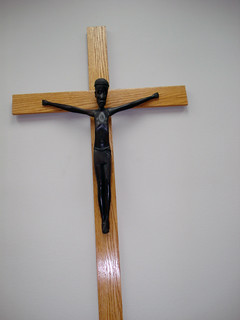Encouraging Words? 6.1 Author Patrice Gopo on Race and Cross-Culture Work
Brad Fruhauff
 6.1 creative nonfiction author Patrice Gopo knows her piece about race, faith, and cross-cultural work isn't exactly the kind of thing you will read and say, "Hey, that's beautiful!"
Last week I told a group of friends about my essay entitled “The Same God,” forthcoming from Relief Journal. As good friends are apt to do, they gushed words of excitement. One person said I must tell everyone I know. He felt others would find what I had to say encouraging.
6.1 creative nonfiction author Patrice Gopo knows her piece about race, faith, and cross-cultural work isn't exactly the kind of thing you will read and say, "Hey, that's beautiful!"
Last week I told a group of friends about my essay entitled “The Same God,” forthcoming from Relief Journal. As good friends are apt to do, they gushed words of excitement. One person said I must tell everyone I know. He felt others would find what I had to say encouraging.
The compliment knocked against feelings of uncertainty I harbored about my essay’s reception. I would describe my exploration of the intersection between power, race, and faith as many things. However the adjective encouraging felt as if I had used sweet to describe a juicy, ripe lemon. Definitely uncomfortable would be a better word choice. Challenging? Perhaps. Thought provoking? I hope so. Encouraging? Likely not.
By considering the role of faith in a situation heavily influenced by power and race, I wanted to force ideas to surface that many people would rather ignore or forget. While the experience I share in my essay happened nearly a decade ago, the catalyst to write came from a recent conversation I had with an acquaintance. The man had spent the last few years engaging in development work in a country not his own. With the casualness of someone speaking about what color he would paint his house or what he would eat for lunch, he spoke of the inability of the country’s citizens to bring about the government reform he wanted. His conclusion was that the foreigners had to take responsibility for driving the change. I left the discussion wondering how the citizens would have felt by this man’s assessment of them? And how did this man have the boldness to believe he knew the needs of a country better than its own people—and the power to act on that belief?
The conversation reminded me of the incident that became the basis for my essay. As I began to write, I searched for reasons why our good intentions often mask subtle feelings of superiority. I thought about how often we all are guilty of assuming we understand an individual or group of people when, truthfully, we only know small flashes of them. Ultimately, how does a choice to follow God speak into these situations?
The reality is faith should speak into issues of real or perceived power imbalances. Faith should speak into issues of skin color and cultural differences. Faith should cause us to pause and consider our actions and attitudes and what they may imply about our belief in God.
Allowing faith into a discussion about race and power can drape the conversation in additional layers of complexity; layers unable to find resolution by individuals merely espousing a belief in God. In the end, however, the decision to work through these complexities may actually lead to a deeper trust in God marked by more grace and greater humility.
Perhaps readers will not finish this essay able to grasp some tangible feel-good thought. But maybe encouraging could be a fitting adjective because my hope is that “The Same God” has the potential to push for deeper thinking around often avoided topics. The essay may even suggest much needed introspection. Words that can challenge even slight growth in uncomfortable areas, these are words that help us on our faith journey. As we pursue that faith journey, we bring glory to our Creator.
And that which helps us bring glory to God is encouraging.
Patrice Gopo is a writer who has had several opportunities to live in different countries. She enjoys weaving these varied experiences into both her essays and poems. Patrice lives in North Carolina with her husband and her daughter.